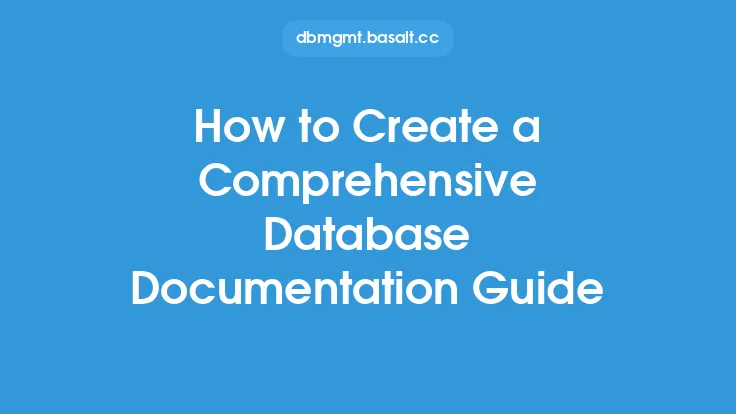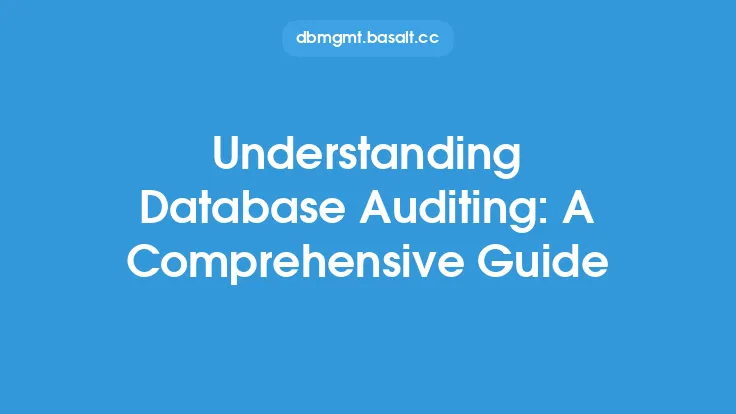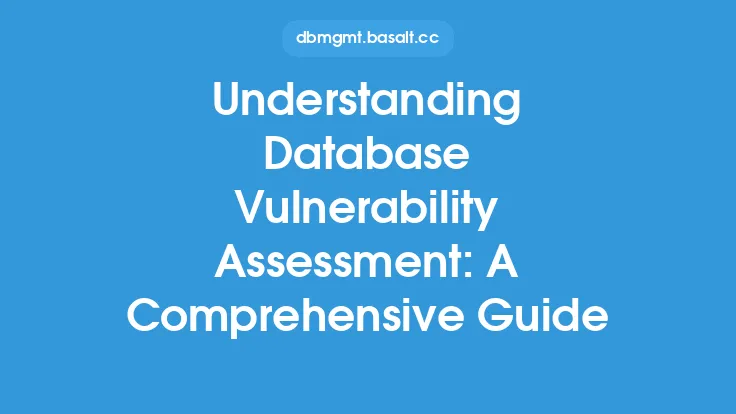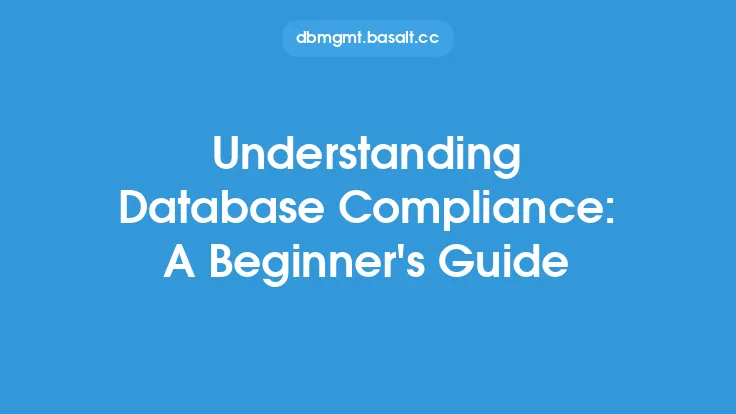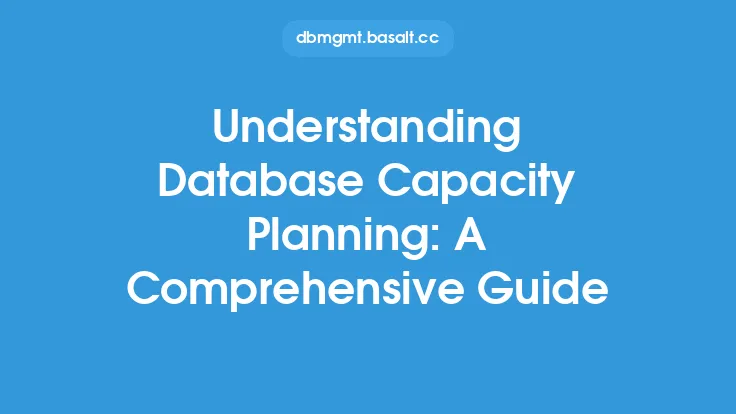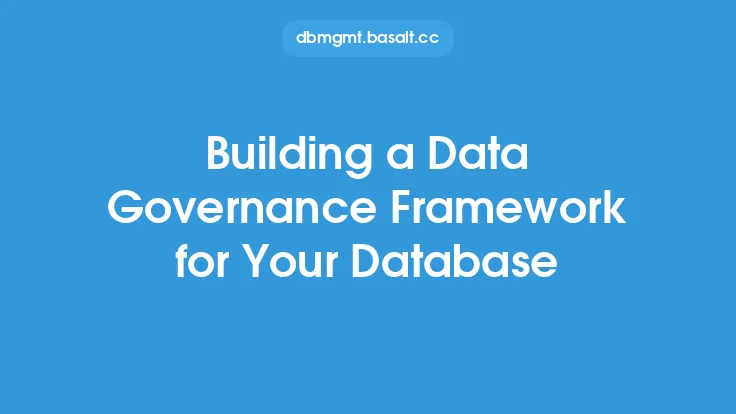Database governance is a critical aspect of database administration that involves the establishment of policies, procedures, and standards to ensure the effective management of an organization's data assets. It encompasses a broad range of activities, including data security, data quality, data integrity, and compliance with regulatory requirements. Effective database governance is essential for organizations to ensure that their data is accurate, reliable, and secure, and that it is used in a way that supports business objectives.
Introduction to Database Governance Concepts
Database governance concepts are built around the idea of creating a framework that ensures data is managed in a consistent and controlled manner. This framework includes policies, procedures, and standards that define how data is created, stored, processed, and disposed of. It also includes the establishment of roles and responsibilities, such as data owners, data stewards, and data custodians, who are responsible for ensuring that data is managed in accordance with organizational policies and procedures. Database governance concepts also include the use of data governance metrics and benchmarks to measure the effectiveness of data management practices and identify areas for improvement.
Database Governance Components
Database governance components include data security, data quality, data integrity, and compliance with regulatory requirements. Data security involves the use of controls such as access controls, encryption, and auditing to protect data from unauthorized access or malicious activity. Data quality involves the use of processes such as data validation, data cleansing, and data normalization to ensure that data is accurate, complete, and consistent. Data integrity involves the use of controls such as data validation, data verification, and data reconciliation to ensure that data is reliable and trustworthy. Compliance with regulatory requirements involves the use of processes such as risk assessments, audits, and compliance monitoring to ensure that data management practices comply with relevant laws and regulations.
Database Governance Frameworks
Database governance frameworks provide a structured approach to database governance by defining the policies, procedures, and standards that govern data management practices. These frameworks typically include components such as data governance policies, data governance procedures, data governance standards, and data governance metrics. Data governance policies define the overall direction and goals of data management practices, while data governance procedures define the specific steps that must be taken to manage data. Data governance standards define the specific requirements that must be met for data management practices, while data governance metrics provide a way to measure the effectiveness of data management practices.
Database Governance Tools and Technologies
Database governance tools and technologies provide a range of capabilities that support database governance, including data security, data quality, data integrity, and compliance with regulatory requirements. These tools and technologies include database management systems, data governance platforms, data quality tools, data security tools, and compliance management tools. Database management systems provide a range of capabilities, including data storage, data processing, and data retrieval, while data governance platforms provide a range of capabilities, including data governance policy management, data governance procedure management, and data governance metrics management. Data quality tools provide a range of capabilities, including data validation, data cleansing, and data normalization, while data security tools provide a range of capabilities, including access controls, encryption, and auditing.
Database Governance Challenges and Opportunities
Database governance challenges and opportunities arise from the need to balance the need for data access and use with the need to protect data from unauthorized access or malicious activity. These challenges and opportunities include the need to manage data growth, the need to manage data complexity, the need to manage data risk, and the need to manage data compliance. Managing data growth involves the use of processes such as data archiving, data purging, and data compression to reduce the amount of data that must be stored and managed. Managing data complexity involves the use of processes such as data modeling, data mapping, and data transformation to simplify data management practices. Managing data risk involves the use of processes such as risk assessments, audits, and compliance monitoring to identify and mitigate data-related risks. Managing data compliance involves the use of processes such as compliance monitoring, compliance reporting, and compliance remediation to ensure that data management practices comply with relevant laws and regulations.
Database Governance and Data Management
Database governance and data management are closely related, as database governance provides the framework for data management practices. Data management involves the use of processes such as data creation, data storage, data processing, and data disposal to manage an organization's data assets. Database governance provides the policies, procedures, and standards that govern these processes, ensuring that data is managed in a consistent and controlled manner. Effective database governance is essential for ensuring that data management practices are aligned with business objectives and that data is used in a way that supports business success.
Database Governance and IT Service Management
Database governance and IT service management are also closely related, as database governance is a critical component of IT service management. IT service management involves the use of processes such as service desk management, incident management, problem management, and change management to manage IT services. Database governance provides the framework for managing the data assets that support these IT services, ensuring that data is managed in a way that supports IT service delivery. Effective database governance is essential for ensuring that IT services are delivered in a way that meets business requirements and that data is used in a way that supports business success.
Conclusion
In conclusion, database governance is a critical aspect of database administration that involves the establishment of policies, procedures, and standards to ensure the effective management of an organization's data assets. It encompasses a broad range of activities, including data security, data quality, data integrity, and compliance with regulatory requirements. Effective database governance is essential for organizations to ensure that their data is accurate, reliable, and secure, and that it is used in a way that supports business objectives. By understanding database governance concepts, components, frameworks, tools, and technologies, organizations can establish a robust database governance program that supports business success.
